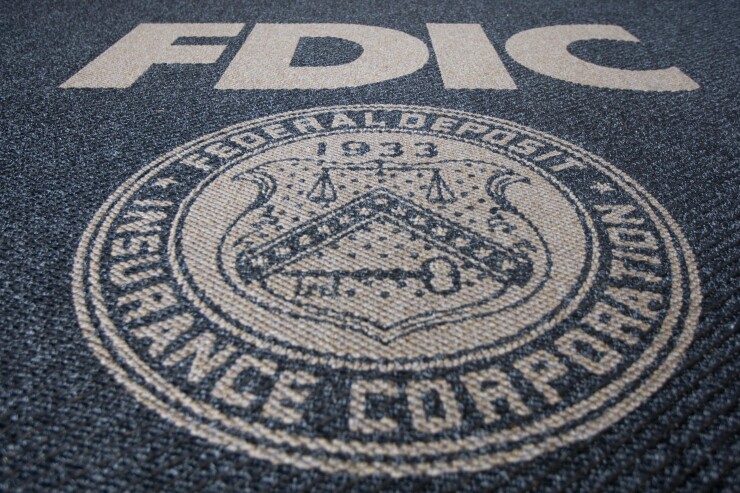WASHINGTON — The Federal Deposit Insurance Corp. didn't assuage banks' concerns when it suggested that an ombudsman oversee the agency's appeals process for banks.
Bank groups were
Banks preferred the short-lived prior arrangement, where the Office of Supervisory Appeals, staffed by private individuals, including those coming from the private sector as well as former examiners, would oversee disputes. That project, started under former Chairman Jelena McWilliams, was barely staffed and functional before the board under Gruenberg voted to disband it.

Last week, the FDIC made a few
The proposed guidelines would also require that materials considered by the committee be shared with both parties to the appeal, and would allow banks to request a stay of supervisory determination while an appeal is pending.
But banks aren't completely happy with those changes as a compromise, particularly as the reliance of the FDIC on their ombudsman.
Jenna Burke, senior vice president and senior regulatory counsel for the Independent Community Bankers of America, said in an interview that the expansion of the role of the ombudsman is "still insufficient to address our concerns about lack of independence in the process."
"The fact is, the ombudsman is still an employee of the FDIC and reports directly to the Office of the FDIC Chairman," she said.
Banks worry that the ombudsman, caught between bankers and the appeals committee, could be put in an "awkward position," Burke said.
"The ombudsman's role is to engage directly with bankers, internal stakeholders, and the public, which may now put the ombudsman in an awkward position of trying to satisfy the interests of a SARC committee, i.e., the board of directors, or the bankers which he's tasked to interface with in a confidential, neutral and informal manner," she said. "So, it's a less than satisfactory outcome."
That concern isn't limited to smaller banks. Gregg Rozansky, senior vice president and senior associate general counsel at the Bank Policy Institute, said that having the ombudsman in the room "could be useful," but as long as the ombudsman doesn't have a vote, the impact is limited.
"Having the ombudsman as a nonvoting member, I don't really know if that really levels the playing field," Rozansky said. "Maybe it's just the patina of impartiality. The ombudsman and the examiners may have been trained to see things in a particular way, and being a non voting member, is that ombudsman going to sway the board SARC's decision one way or the other?"

The FDIC's suggestion to amplify the role of the ombudsman in the process resembles the appeals process at the Office of the Comptroller of the Currency, said Alexandra Steinberg Barrage, partner at Davis Wright Tremaine and former associate director of policy in the FDIC. That could help simplify the appeals process for banks by making it more similar across the regulatory agencies.
The ombudsman should help the independence of the appeals process, despite being an employee of the FDIC, Barrage said.
"Even though the ombudsman is appointed by the chairman, they're still respected as neutral arbiters, so having them as a nonvoting member makes sense to me," she said.
The appeals committee change was one of the first that Gruenberg and his Democratic-controlled board made after a partisan scuffle led to the departure of McWilliams. The board remains made up solely of Democratic appointees — Rohit Chopra of the Consumer Financial Protection Bureau and acting head of the OCC Michael Hsu.
That's part of the concern, Barrage said, when banks talk about the independence of the review process.
"The elephant of the room of course is the current composition of the board and whether that appeals process truly achieves independence," she said. "A process that doesn't rely on board-level composition to me is the one that makes sense if you're trying to preserve independence."





